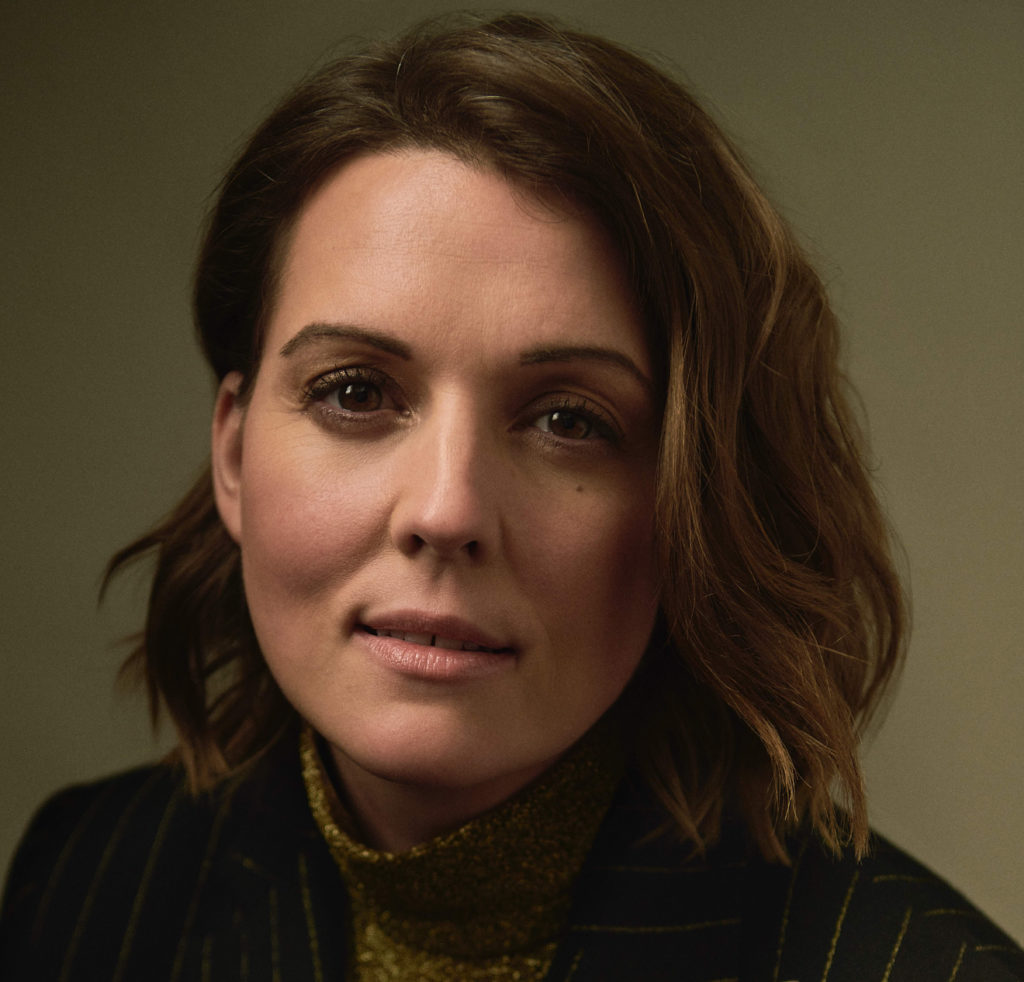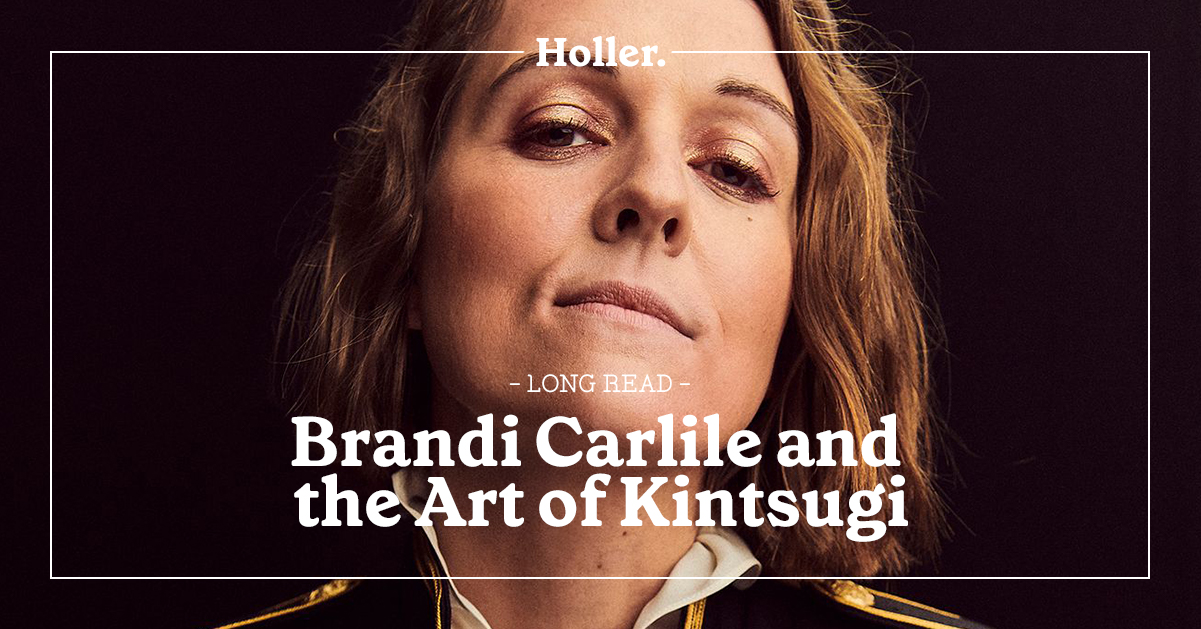I’ve long suspected something about Brandi Carlile, but it wasn’t until I read her new memoir, Broken Horses, that I fully knew it to be true: She is the scrappiest mystic this side of G.I. Gurdjieff, if not Joan of Arc. For the past 13 years, my suspicion was rooted merely in watching her, both up close and from a distance, cast a lasting spell on pretty much everyone who is lucky enough to step into her orbit. Turns out, though, the real magic of her life is explained by numerous inexplicable moments — pivotal, life-defining, soul-stirring moments that definitely count as “mysteries,” with some seemingly coming close to “miracles.” On top of that, anyone who can write a line like “it smelled like music and dreams” to describe the backstage of a concert venue is touched. By what, I’m not completely sure, but touched, all the same.
But let’s back up a bit, because, when it comes to understanding Brandi, it’s best to start on the 1. Specifically, the 1 as her enneagram type: “Ones are conscientious and ethical, with a strong sense of right and wrong. They are teachers, crusaders, and advocates for change: always striving to improve things, but afraid of making a mistake. Well-organized, orderly, and fastidious, they try to maintain high standards, but can slip into being critical and perfectionistic.”
If you’ve seen Brandi’s Instagram videos regarding sheet-folding, then that “fastidious” part rings true. Likewise for the “striving” bit, when she’s caught singing a third harmony part along with an Indigo Girls live stream. She simply can’t help herself on either account. As for the rest of those characteristics, they come into incredibly sharp focus in Broken Horses which is a thoroughly compelling series of snapshots of a thoroughly compelling person and artist who was always destined for success, not just because of her immense talent, but also because of her steadfast values. That is to say, Brandi has done well because she both is good and does good. Perfection in herself and advocacy for others, the two main winds in her sails.
A second key to understanding Brandi is a case she makes in the book, rather convincingly, for many of her family members without ever applying it to herself: She is deeply, DEEPLY charismatic. When you meet her, she gives you her full attention, as the rest of the world falls away for just a little while. She homes in on something that connects the two of you — a logo on your t-shirt, a gap in your teeth — so that you know, without any doubt, that she sees YOU and appreciates YOUR presence in that shared moment. That is quietly evidenced on page after page of the book, as she brings the reader into her world to witness each step of her own toward being seen, appreciated, and connected.
To quote her words in a section about writing down the story of your life, “It feels wonderful to be known, even if it’s just by you.” She’s not wrong. Not at all. Telling your own story allows you to understand it in an objective way as just that… a story. And, in doing so, you undercut the power it holds over you, be that power rage, resentment, or regret. There’s no doubt in my mind that the puissant display of vulnerability that is Broken Horses helped Brandi understand and undercut many of the less-positive forces at work inside herself. That lends itself, of course, to her pursuit of personal perfection.

That said, by filling Broken Horses with vividly detailed stories of her life, Brandi shines a light on and makes the space for indelibly etched memories from many of our lives, too: the mind-blowing moment of realizing parents are fallible humans rather than superheroes; the deep-seated shame of poverty consciousness that never really leaves you; the exhilarating heartbreak of being someone’s emotional lover yet never more; the foundational impact of a life in constant motion that never lets you rest; the soul-scarring humiliation of being rejected for who you are; and so much more.
Even as she does so, though, she never wavers in either empathy for others or hope for herself. One of Broken Horses‘ greatest take-aways is the lesson that, if you feel special or out of place, hold onto that feeling. Not in an arrogant way, in an ambitious way. Let it pull you out of your circumstance and onto whatever “stage” is meant for you. And, once there, let yourself fall into the vulnerability of being on that stage and trusting that the audience — proverbial or real — will hold you up. You can even dress up like a Honky Cat, if that’s your jam. (Spoiler: It very much was and is Brandi’s jam.)
The circumstances out of which Brandi pulled herself involved deep poverty and social isolation. To borrow from Maya Angelou, “Music was [her] refuge. [She] could crawl into the space between the notes and curl [her] back to loneliness.” I, and probably many of you, know that song all too well. The thread of music weaves through our lives providing refuge and respite whenever we have needed it… which has been often.
Having moved around a lot as a kid, much like Brandi did, I also have memories categorized based on what house or school I was in at the time. That kind of existence requires an ability to mold yourself to each moment in order to fit in everywhere, while never belonging anywhere. It’s a rough go at any age, but especially taxing as a teen, and that’s only the surface-level effect. Underneath that is a constant state of in-betweenness, a life lived in shades of grey, always on high alert for what’s coming next, either always or never completely in the now. Somehow, Brandi found a fix that has allowed her to bask in a vibrant inner world while still soaking up every drop of the outer. It’s a very particular die that was cast for her at four years old.
In the first chapter of Broken Horses, Brandi recounts her early-life survival of meningitis, during which she spent time in a coma. She writes of the liminal state that it “informs who we are in between two worlds… which is probably who we really are.” And, thus, we have arrived at another of the book’s best lessons: the integration of our different selves into a whole Self.
In the middle of chapter 13, Brandi alternately describes Brennan Manning as a “pop-culture Christian icon” and a “disgraced, divorced, alcoholic Franciscan priest,” singing his praises, all the while. She notes that his work taught her to replace “The Lord is my shepherd; I shall not want,” with “The Lord is my shepherd; I lack nothing.” She goes on to explain, “This subtle difference is night and day to a self-punishing person.” And, yeah, it sure is — even to a non-Christian, self-punishing person like me. It’s also a milestone, if not a gateway, on the path to a whole Self.
As she tells it, Brandi’s life is a kinetic, in-progress example of this quest. From her past as a poor kid and a bad student with notable talent and big dreams, to her present as a successful artist and a tireless crusader with a fishing obsession and control issues, the balance of those differences is one she never quite managed to reconcile, within or without, until her now-wife Catherine showed up.
These days, Brandi’s whole Self comes replete with said wife, two kids, a dog, a cat, a left, a right, a compound of loved ones, a throng of adoring fans, a bunch of awards, and a New York Times #1 best-selling book (and audiobook!). In so many examples throughout that best-seller and beyond, Brandi is the rising tide that lifts every other boat around her, and there have always been a LOT of metaphorical boats around her. Brandi collects her people, gathers them up and keeps them close. Being the center of a circle is the surest way to belong, after all. But there’s more to it than that. Having been an underdog and an outlier for most of her life, she will forever fight for her kind. And, frankly, the good money is on her winning. Every time. Which is weird since the first thing she ever won in her whole life was an award from the UK Americana Music Association… in 2019.
To read Broken Horses is to witness the human version of kintsugi, the Japanese art of repairing cracks with gold. Through her stories, Brandi examines the beauty of her own brokenness as repaired by forgiveness, resilience, humility, and grace. And, in that revealing, she allows us to view our own flaws in the same tender-hearted way, so that we, too, might heal our wholes.
